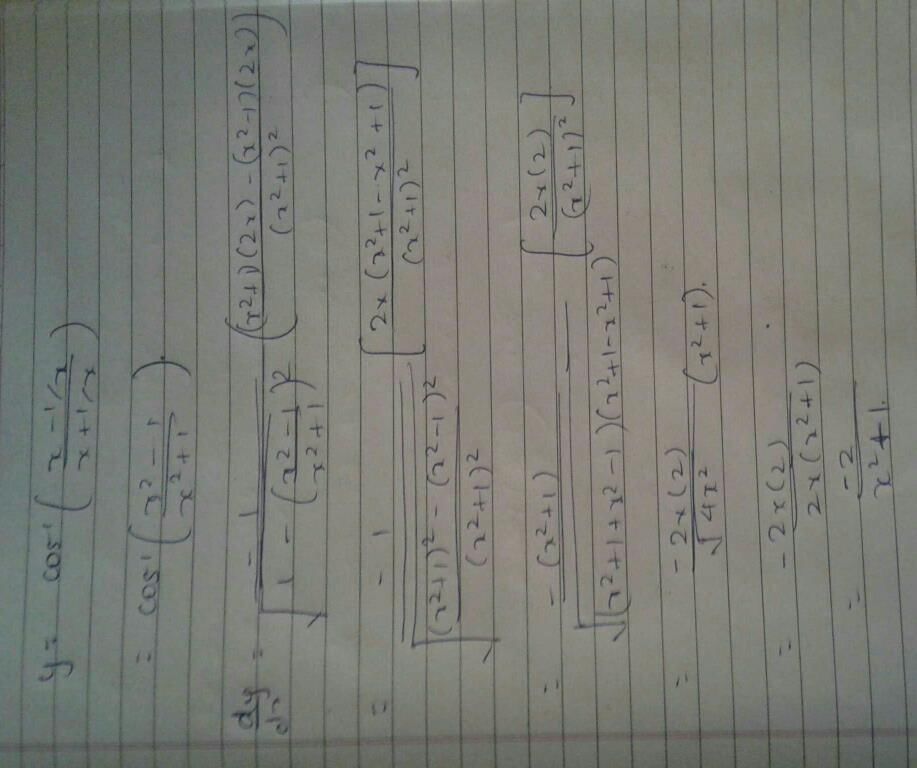Class 12 Exam > Class 12 Questions > Y= cos-1((x- 1/x )/(x +1/x)) Find dy/dx?
Start Learning for Free
Y= cos-1((x- 1/x )/(x +1/x)) Find dy/dx?
Most Upvoted Answer
Y= cos-1((x- 1/x )/(x +1/x)) Find dy/dx?

Community Answer
Y= cos-1((x- 1/x )/(x +1/x)) Find dy/dx?
Problem:
Find dy/dx, where y = cos^(-1)((x - 1/x)/(x + 1/x))
Solution:
To differentiate y = cos^(-1)((x - 1/x)/(x + 1/x)), we can use the chain rule and the quotient rule.
Step 1: Rewrite the expression
Let's start by simplifying the expression inside the inverse cosine function.
Let A = (x - 1/x)/(x + 1/x)
Step 2: Simplify A
To simplify A, we can multiply both the numerator and the denominator by x:
A = (x^2 - 1)/(x^2 + 1)
Step 3: Differentiate A
Now, let's differentiate A with respect to x using the quotient rule:
dA/dx = [(2x)(x^2 + 1) - (x^2 - 1)(2x)]/(x^2 + 1)^2
= (2x^3 + 2x - 2x^3 + 2x)/(x^2 + 1)^2
= 4x/(x^2 + 1)^2
Step 4: Differentiate y using the chain rule
To differentiate y = cos^(-1)(A), we can use the chain rule:
dy/dx = (dy/du) * (du/dx)
Where u = (x - 1/x)/(x + 1/x)
Step 5: Differentiate cos^(-1)(u)
To differentiate cos^(-1)(u), we can use the formula:
d(cos^(-1)(u))/du = -1 / sqrt(1 - u^2)
Step 6: Substitute u and dA/dx into the chain rule
Now, let's substitute u and dA/dx into the chain rule:
dy/dx = (-1 / sqrt(1 - u^2)) * (4x/(x^2 + 1)^2)
Step 7: Simplify the expression
Finally, let's simplify the expression:
dy/dx = (-4x) / (sqrt(1 - u^2) * (x^2 + 1)^2)
And that's the expression for dy/dx.
Find dy/dx, where y = cos^(-1)((x - 1/x)/(x + 1/x))
Solution:
To differentiate y = cos^(-1)((x - 1/x)/(x + 1/x)), we can use the chain rule and the quotient rule.
Step 1: Rewrite the expression
Let's start by simplifying the expression inside the inverse cosine function.
Let A = (x - 1/x)/(x + 1/x)
Step 2: Simplify A
To simplify A, we can multiply both the numerator and the denominator by x:
A = (x^2 - 1)/(x^2 + 1)
Step 3: Differentiate A
Now, let's differentiate A with respect to x using the quotient rule:
dA/dx = [(2x)(x^2 + 1) - (x^2 - 1)(2x)]/(x^2 + 1)^2
= (2x^3 + 2x - 2x^3 + 2x)/(x^2 + 1)^2
= 4x/(x^2 + 1)^2
Step 4: Differentiate y using the chain rule
To differentiate y = cos^(-1)(A), we can use the chain rule:
dy/dx = (dy/du) * (du/dx)
Where u = (x - 1/x)/(x + 1/x)
Step 5: Differentiate cos^(-1)(u)
To differentiate cos^(-1)(u), we can use the formula:
d(cos^(-1)(u))/du = -1 / sqrt(1 - u^2)
Step 6: Substitute u and dA/dx into the chain rule
Now, let's substitute u and dA/dx into the chain rule:
dy/dx = (-1 / sqrt(1 - u^2)) * (4x/(x^2 + 1)^2)
Step 7: Simplify the expression
Finally, let's simplify the expression:
dy/dx = (-4x) / (sqrt(1 - u^2) * (x^2 + 1)^2)
And that's the expression for dy/dx.

|
Explore Courses for Class 12 exam
|

|
Similar Class 12 Doubts
Y= cos-1((x- 1/x )/(x +1/x)) Find dy/dx?
Question Description
Y= cos-1((x- 1/x )/(x +1/x)) Find dy/dx? for Class 12 2024 is part of Class 12 preparation. The Question and answers have been prepared according to the Class 12 exam syllabus. Information about Y= cos-1((x- 1/x )/(x +1/x)) Find dy/dx? covers all topics & solutions for Class 12 2024 Exam. Find important definitions, questions, meanings, examples, exercises and tests below for Y= cos-1((x- 1/x )/(x +1/x)) Find dy/dx?.
Y= cos-1((x- 1/x )/(x +1/x)) Find dy/dx? for Class 12 2024 is part of Class 12 preparation. The Question and answers have been prepared according to the Class 12 exam syllabus. Information about Y= cos-1((x- 1/x )/(x +1/x)) Find dy/dx? covers all topics & solutions for Class 12 2024 Exam. Find important definitions, questions, meanings, examples, exercises and tests below for Y= cos-1((x- 1/x )/(x +1/x)) Find dy/dx?.
Solutions for Y= cos-1((x- 1/x )/(x +1/x)) Find dy/dx? in English & in Hindi are available as part of our courses for Class 12.
Download more important topics, notes, lectures and mock test series for Class 12 Exam by signing up for free.
Here you can find the meaning of Y= cos-1((x- 1/x )/(x +1/x)) Find dy/dx? defined & explained in the simplest way possible. Besides giving the explanation of
Y= cos-1((x- 1/x )/(x +1/x)) Find dy/dx?, a detailed solution for Y= cos-1((x- 1/x )/(x +1/x)) Find dy/dx? has been provided alongside types of Y= cos-1((x- 1/x )/(x +1/x)) Find dy/dx? theory, EduRev gives you an
ample number of questions to practice Y= cos-1((x- 1/x )/(x +1/x)) Find dy/dx? tests, examples and also practice Class 12 tests.

|
Explore Courses for Class 12 exam
|

|
Signup for Free!
Signup to see your scores go up within 7 days! Learn & Practice with 1000+ FREE Notes, Videos & Tests.



















